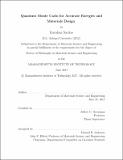Quantum Monte Carlo for accurate energies and materials design
Author(s)
Saritas, Kayahan
DownloadFull printable version (2.170Mb)
Other Contributors
Massachusetts Institute of Technology. Department of Materials Science and Engineering.
Advisor
Jeffrey C. Grossman.
Terms of use
Metadata
Show full item recordAbstract
Quantum Monte Carlo (QMC) is an electronic structure calculation method that is capable of calculating incredibly accurate solutions of Schrödinger equation of quantum mechanics for real systems. However, QMC is computationally very expensive compared to density functional theory (DFT) method, such that its application has been limited. In addition, QMC is a stochastic (Monte Carlo) method, meaning that the way calculations are initialized, where a lot of user effort is invested, is crucial for getting accurate results. Computational expense can be justified if the data would be used repeatedly, however the lack of automatization is a severe problem, if QMC would be used in materials discovery. In Chapter 4, we show our automated calculation strategy for formation energy of periodic materials using QMC. We show that our method performs almost by an order of a magnitude more accurate, compared to high throughput DFT strategies having empirical corrections. Nevertheless, it would be beneficial to understand when DFT methods fail such that QMC is used only when the computational expense is justified. A single DFT functional rarely performs uniformly accurate accross different materials and properties due to nonsystematic errors. In Chapter 5, we investigate one specific example: dihydroazulene ring opening photoisomerization, where different substitutions on the ring opening moiety introduce isomerization enthalpy errors up to 0.8 eV. We show that GGA exchange is the main reason for failure in B3LYP, PBE and TPSSH functionals. However, performing a test, similar to the Chapter 5, on each chemical reaction can be an intimidating task where the benchmark set must be carefully devised by an expert in the field. In the absence of experiments, the DFT functional choice is still often done in heuristic way. In Chapter 6, we demonstrate how we can systematically analyze benchmark sets using machine learning to provide highly accurate reaction energies and provide DFT functional selection for different classes of materials when high accuracy calculations or experiments are not available. Our approach provides probabilities of getting accurate results for a reaction that is investigated using each DFT functional.
Description
Thesis: Ph. D., Massachusetts Institute of Technology, Department of Materials Science and Engineering, 2017. This electronic version was submitted by the student author. The certified thesis is available in the Institute Archives and Special Collections. Cataloged from student-submitted PDF version of thesis. Includes bibliographical references (pages 107-119).
Date issued
2017Department
Massachusetts Institute of Technology. Department of Materials Science and EngineeringPublisher
Massachusetts Institute of Technology
Keywords
Materials Science and Engineering.